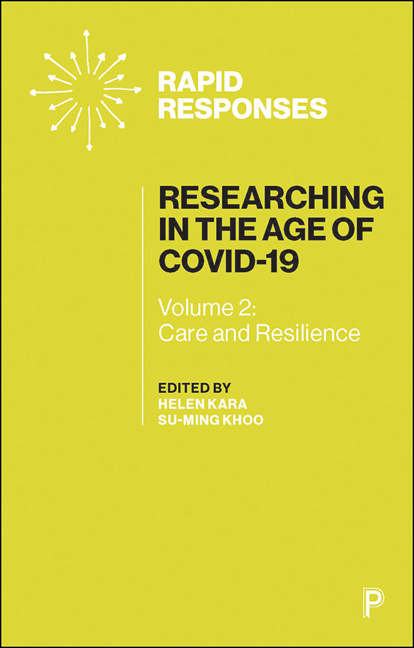2 - “I Don’t Know What I’d have Done Without this Project”: Oral history as a Social and Therapeutic Intervention During COVID-19
Published online by Cambridge University Press: 23 March 2021
Summary
As COVID-19 spread across the globe during March 2020, communities and countries went into lockdown and social isolation became a mainstream public health strategy. NHS at 70, a UK oral history programme that had been collecting personal testimonies from patients, staff and the public about the history of the UK's National Health Service (NHS) since 2017 suspended face-to-face interviews. At this point the project had trained over 150 volunteer interviewers in oral history skills and collected more than 800 interviews from people aged 18 to 100+ years with good diversity across ethnicity, geography and perspective. The project's overarching aim is to create an inclusive archive of NHS history that features voices from communities that are seldom heard and do not have strong historical representation. The choice of oral history as method was driven by this aim.
Oral history's value rests in its capacity to capture personal experiences while giving agency to interviewees to shape the form and meaning of the interview, thereby encouraging sense making and reflection (Maitlis and Christianson, 2014; Kroeze and Vervloet, 2019). The power of oral history to democratize history by broadening reach was further strengthened by our adoption of a volunteer model whereby we train people from all walks of life as interviewers (Jordanova, 2000, p 53). It has gained us access to communities that an academic team working alone would find difficult to replicate. The scale of the crisis and its potentially devastating consequences convinced us of our moral responsibility to maintain the social connection between the project and its publics by capturing the unfolding of COVID-19 and this extraordinary period in the longer history of the NHS (Sloan, 2014, p 264). The response from interviewees was resoundingly positive: we have interviewed over 250 people, representing patients, policy makers, frontline NHS staff, young people and individuals with high risk conditions, with many people contributing regularly as the crisis continues. By 2022, there will be three datasets comprising pre-, during and post-COVID-19 interviews. The pre-COVID-19 interviews form a baseline for the later sets and will enable deeper understandings of the impacts and legacies of COVID-19 on individual experiences and the broader history of the NHS than post-COVID-19 interviews alone.
- Type
- Chapter
- Information
- Researching in the Age of COVID-19Volume II: Care and Resilience, pp. 25 - 34Publisher: Bristol University PressPrint publication year: 2020

